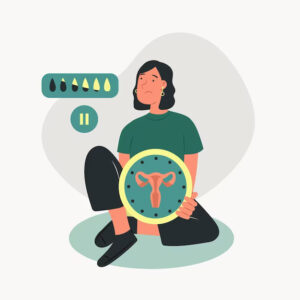What is Fertility
Fertility is natural capability in a woman to conceive a child. Women are born with 1-2 million eggs, ovaries produce these eggs and during ovulation eggs are released for fertilization and a woman can get pregnant. As you get older, the quality and quantity of eggs decreases. Women in their early 20s have a 25-30% chance of getting pregnant each month. Female fertility usually begins to decline in her early 30s, and at the age of 35-40, there is a 5% chance of getting pregnant per cycle.
What is infertility
Infertility is a condition between men and women when the reproductive system of either one or both is not futile enough for them to get pregnant. Fertility problems affect more than 48 million couples worldwide. Female infertility can be due to poor lifestyle, smoking, pcod, pcos, ovarian insufficiency, fibroids, endometriosis and more. Low testosterone, sexual dysfunction, Obesity and poor lifestyle are few reasons for male infertility.
What is gut health
The gut contains trillions of microbes, both beneficial and harmful. Together these make up what we call the “gut microbiome.” Maintaining a healthy bacterial balance in the microbiome is important. Factors such as diet, exercise, medications, and even genetics can affect all aspects of your health, for better or worse, by influencing its composition and range. Gut health affects many aspects of our health, from our mood to our immune system.
What is Gut Health and its Relation to Fertility
The connection between gut health and fertility refers to the potential connection between a person’s gut and their ability to conceive and maintain a pregnancy. According to research, gut microbiota, immunity, hormone regulation, nutrient absorption, and metabolic health may play a role in fertility. Sensitive skin can affect the eye hormonal balance necessary for optimum vision and pregnancy. Hormone regulation is important for children’s health as it regulates menstruation, ovulation, and other reproductive activities. The gut microbiota may interact with endocrine systems, influencing the synthesis and regulation of growth hormones.

The overall health of the gut is directly related to metabolic health, and conditions such as obesity and insulin resistance can affect fertility. An imbalance in the gut microbiota has been associated with metabolic problems that can lead to developmental problems.
How Good Gut Health Can Cure infertility
Yes, Good Gut Health can Cure Infertility because Gut Health is very much important for all the couples who are trying to conceive because a poor Gut Health can cause Hormonal Imbalance and Hormonal imbalance is one of the leading causes in males and females.

Gut microbiota hormones can have a direct impact on children’s health by affecting nutrient absorption and immunity. Additionally, certain gut bacteria may play a role in estrogen, which can affect fertility.
Foods that can help in increasing Gut Health and Fertility
Certain foods can help support Gut Health and fertility. Food and lifestyle choices have a huge impact on the fertility of men and women. The food you eat can
Increase fertility by affecting your gut, blood flow, hormone levels, and overall health, among other factors such as lifestyle and stress.

Beans and Lentils – Beans and lentils are rich in fiber and protein to help support ovulation. Replacing animal protein with plant protein may reduce the risk of ovulation infertility and gut health. These two legumes are also an excellent source of folic acid, which is important in pregnancy and the development of healthy embryos.
Sunflower Seeds – Eating sunflower seeds is an easy way to help maintain sperm quality without making major dietary changes.
- Fruits – Antioxidant-rich foods such as fruits and vegetables are rich in vitamin C and folic acid, which promote healthy fetal growth after conception. Raspberries, blueberries, and strawberries all contain natural antioxidants and anti-inflammatory phytonutrients, two ingredients that can boost fertility in both men and women. Women with high fruit intake may have infertility, which will make the stomach healthy.
Avocado – Avocados are rich in vitamin K, potassium, and folic acid, which help your body absorb vitamins, control blood pressure, and more. They also contain monounsaturated fats (healthy fats) that provide fiber and folic acid, which we know is crucial for early life.
Quinoa – Quinoa is so important because it’s not just a carb-free Compound, it’s also a high-quality grain. The best source of protein, zinc, and folic acid. Therefore, these products provide a strong prenatal service during the healthy development of the fetus after pregnancy. Quinoa delivers all the essential amino acids that meat products provide, with no added harm.
Men who regularly eat walnuts improve sperm health, which increases strength, quantity, and morphology.
Pomegranates – Pomegranates are rich in antioxidants and are said to aid fertility. Pomegranates contain vitamin C, folate and potassium, all of which
have been shown to affect male fertility. Pomegranate can help increase sperm concentration and motility in men. For women, pomegranate helps increase blood flow to the uterus and supports the health of the uterus.
Foods to Avoid in Fertility and Gut Health
Soda and sugary foods – Fizzy drinks and other sugary foods to our list of foods to avoid when trying to get pregnant. Avoid as much sugar as possible. Soft drinks can affect egg quality. Hidden sugars are found in many of the foods we eat regularly, from fruits and vegetables to baked goods and sauces. While trying to get pregnant, do not drink extra carbonated drinks such as soda, or lemonade, do sports, and do not drink alcohol.
Foods With Carbs – When we eat carbohydrates, they can raise blood sugar, cause pain, affect hormones, inhibit ovulation, and have been shown to affect pregnancy in general, especially when combined with low carbohydrates. – eat more fiber. Any food that does not contain protein or fat is a carbohydrate. Our bodies don’t need carbohydrates (just air, water, fat, and some protein), but that doesn’t stop most of us from overeating bagels, chips, pasta, bread, cereal, and other foods. produce food. They’re filling and comforting, but every carbohydrate we eat eventually turns into sugar.
Low Dairy Fat – Men and women respond very differently to the effects of dairy products on fertility. While low-fat (or non-dairy) milk may be beneficial for male fertility, low-fat milk for women is considered a sterile food. When the fat in the milk is removed, male hormones called androgens remain. For women, androgens can interfere with menstruation, putting them at risk for PCOS and infertility.
Excessive alcohol consumption – Limiting alcohol consumption during pregnancy is a well-known tip to protect the health of the unborn child. But what many people don’t know is that even a small amount of alcohol ingestion by a male or female partner can harm a couple’s ability to conceive.
Gut health has received a lot of attention in the past few years. Scientists and Nutrition experts have identified that gut health plays a much bigger role in the well being of our overall body. Ruhi Rajput, Nutritionist expert in hormone reset diet speaks that Gut health is the first step towards managing a better hormone regulation. Major reason for Pcod and Pcos is insulin resistance which happens mainly because of poor choice of food that leads to insulin spike. Also estrogen dominance happens due to poor gut microbiome leading to very common conditions like fibroid and endometriosis. Mostly these occur due to poor lifestyle and can be rectified with modification in diet and lifestyle.



